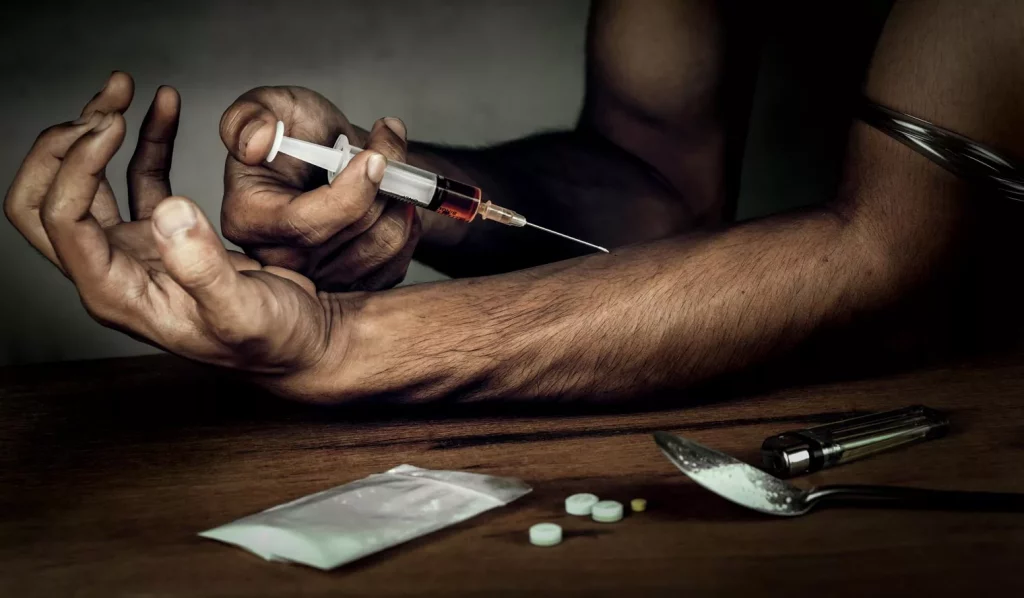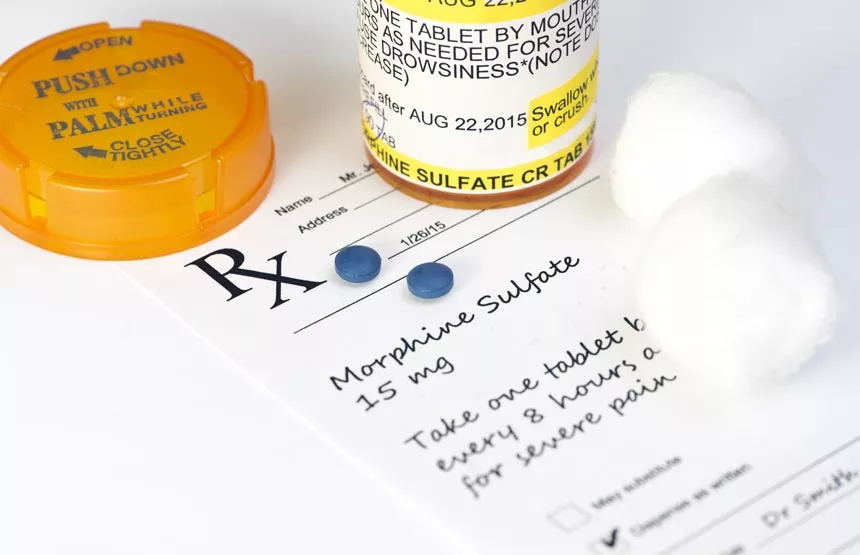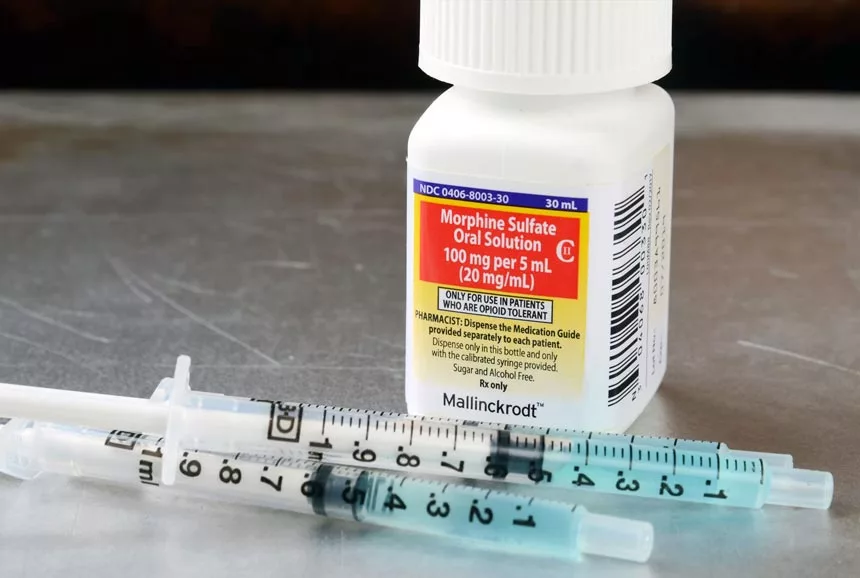What is Morphine?
Table of Contents
- What is Morphine?
- How is Morphine Used?
- How Does Morphine Affect the Body?
- How Addictive is Morphine?
- Understanding Morphine Addiction
- Who is at Risk of Becoming Addicted to Morphine?
- Recognizing a Morphine Addiction
- Physical Side Effects of Morphine Abuse
- Mental Side Effects of Morphine
- Is it Possible to Overdose on Morphine?
- How is a Morphine Addiction Treated?
- The Importance of Medical Detox in Chronic Morphine Treatment
- Inpatient Treatment
- Outpatient Treatment
- Does Insurance Cover Morphine Addiction Treatment?
- Finding Morphine Addiction Treatment Options That Work For You
- Medically Reviewed By
Morphine is a powerful opiate derived from the seeds of the opium poppy plant. It is commonly used to treat severe or chronic pain, such as after major surgeries or in cancer patients who have become tolerant to other pain medications and are not seen as high risk for morphine addiction.
Morphine is currently classified as a Schedule II controlled substance by the Drug Enforcement Administration (DEA). This means that while Morphine has an accepted medical use, it also poses a high risk for addiction.
When prescribing this drug as a pain relief medication, most doctors will do so only in relatively low doses, and for short periods of time.
However, while certain precautions have been put in place to lower the addictive potential of medically prescribed Morphine, illicitly-produced variants of this drug still pose a major threat of addiction.
Keep reading to find out more regarding addiction to morphine and the most effective forms of treatment!
How is Morphine Used?
There are several methods of Morphine administration that a person may use, each of which may produce different effects. The most common ways that a person may use this drug is by injecting it directly into the bloodstream or orally ingesting Morphine tablets or syrups.
Some people may also choose to crush these tablets into a powdered form, which can then be smoked or snorted. Recently, prescription Morphine pills have been made to be more abuse-deterrent in order to reduce addiction rates to this drug.
However, while this preventative measure has been effective in lowering rates of prescription-Morphine abuse, this has not impacted public use of illicitly-manufactured forms of this drug.
How Does Morphine Affect the Body?
Morphine has a direct impact on the central nervous system, which consists of the brain and spinal cord. Once this drug reaches the brain, it binds to opioid receptors in several brain regions. In particular, within the nucleus accumbens, or the brain’s “reward” pathways.
Once this interaction occurs, the Morphine then releases a flood of dopamine into the brain. This can produce feelings of euphoria, pain-relief, and extreme relaxation, while significantly reducing cognitive functions.
This relieving and euphoric high is what makes this drug particularly effective in treating severe pain. However, this pleasurable rush is also what makes it so easy to form a physical dependence on Morphine as tolerance develops to this substance.
How Addictive is Morphine?
Morphine, as with all Opiates and Opioids, carries a very high level of risk for addiction. Morphine-induced highs cause a user to feel great at first, both physically and emotionally. When taking the opiate, many users report feeling clarity, energy, a lack of pain, and euphoria.
This causes many individuals to continue taking the drug well past their prescribed levels. This can lead them to build a Morphine tolerance, causing many to take high doses in order to achieve the desired effect. This behavior can quickly result in a potentially fatal addiction.
Furthermore, without a prescription, this drug can be hard and particularly costly to find, causing many to turn to use the deadly street drug, heroin. Taking this drug, even with the utmost care, can quickly become one of the most dangerous forms of addiction a person can develop.
Understanding Morphine Addiction
Morphine addiction is an incredibly dangerous and slippery slope, as it is one of the strongest prescription opiate painkillers that a person can abuse. Even those with a prescription for this drug can become hooked on the euphoric and pain-free feelings that the narcotic can cause.
This is particularly true amongst Morphine addicts who are struggling with a mental health disorder alongside their opioid abuse. In these cases, Morphine’s stress-relieving properties can make these individuals particularly tempted to misuse this drug.
There is also the unfortunate reality that many users who start out taking Morphine to end up switching to its illicit and deadly counterpart, heroin, due to cost and/ or ease of availability. While a Morphine addiction can be extremely dangerous on its own, heroin is even more so.
Thus, if you believe that you or a loved one may be struggling with Morphine abuse, it is strongly recommended that you seek out professional addiction treatment services as soon as possible before your addiction gets any worse.
Who is at Risk of Becoming Addicted to Morphine?
As with any drug, Morphine does not discriminate among its users. When it comes to Opiate addiction, this drug captures everyone from kids to grandparents, blue-collar workers to executives, and poverty-stricken individuals to well-off families.
With that being said, there are certain individuals who may be more at risk of developing a Morphine or other drug addiction. Knowing the risks of substance abuse can help these individuals take preventative action in avoiding these behaviors.
The primary initial cause of the addiction is typically a prescription for the medication, used to treat severe pain caused by injuries, or debilitating health problems. The user ends up gradually forming a Morphine dependence, feeling as though they need this drug to function.
However, a prescription for this drug is not necessary to form an addiction to it. There are several individuals who may have gained initial access to Morphine through another individual, or through using illicitly-manufactured versions of this drug.
In these cases, people with a personal or family history of substance abuse, who are regularly surrounded by other Morphine addicts, or who frequently inhabit high-stress environments – such as through home, work, or school – are more likely to begin abusing this opiate.
Recognizing a Morphine Addiction
Recognizing that you or a loved one may be struggling with an addiction of any form can be extremely difficult, let alone one involving a substance as dangerous as morphine. However, accepting that there is a problem is the first step to being able to resolve this substance abuse.
According to the Diagnostic and Statistical Manual of Mental Disorders (DSM-5), there are several signs that may serve as evidence of opioid addiction, including:
- Taking an opioid in larger amounts or over longer periods of time than originally intended.
- Consistently being unsuccessful with efforts to cut down or control opioid use.
- Spending large amounts of time obtaining and using the opioid or recovering from its effects, or experiencing compulsive drug-seeking behaviors.
- Experiencing intense drug cravings.
- Recurring inability to fulfill major roles and responsibilities at work, school, or home.
- Continuing to use the opioid despite this causing persistent social or interpersonal problems.
- Giving up important social, occupational, or recreational activities to continue opioid use.
- Using the opioid in situations in which this may be physically hazardous (i.e. driving).
- Continuing to use the opioid despite this causing or worsening physical or psychological problems.
- Developing a tolerance to the opioid, and needing to use larger doses in order to achieve desired effects.
- Experiencing withdrawal symptoms when not using the opioid, or needing to continue using in order to avoid these symptoms.
If you recognize any of these behaviors in you or a loved one, it is crucial that you immediately begin seeking out addiction treatment services. As this addiction begins to take further hold, continuing to acquire and use Morphine will become a priority.
This addiction in particular can be quite expensive to maintain, causing many to slip on bills, and even resort to theft. Over time, the likelihood of engaging in criminal activity or carrying out dangerous activities in a morphine-induced state can significantly increase.
Unfortunately, with a higher risk of engaging in these behaviors, there also comes a higher likelihood of facing serious repercussions for them, whether these be legal, mental, or physical in nature.
Physical Side Effects of Morphine Abuse
Morphine has many physical effects, almost all of which can be severe in nature. This pain medication attacks the body’s central nervous system, which regulates the vast majority of the body and brain’s functions, including breathing, sight, blood flow, and organ functionality.
The drug slowly takes control of the body and can cause respiratory issues, seizures, and many other incredibly terrifying side effects. Some of the most common physical side effects of Morphine Addiction include:
- Respiration Issues
- Digestive Problems
- Liver Failure
- Kidney Failure
- Heart Failure
- Loss of Vision
- Weight Loss
- Pain while Urinating
- Collapsed Veins from Injecting
- Liver Damage
- AIDS
- Hepatitis
- Death
If you or a loved one is experiencing any of the above symptoms, it is strongly recommended that you seek emergency medical attention immediately before this dependence is able to progress any further; possibly past the point of no return.
Mental Side Effects of Morphine
Morphine’s hold on the mind can be one of the most mentally agonizing processes to go through. Morphine, as many opiates do, changes the brain’s chemistry in a manner that places it on a level of needs comparable to food, water, and air.
In many cases, the need for the drug can trump the need for shelter in the brain, causing many to lose their homes in pursuit of maintaining their Morphine addiction. While losing a home is a very traumatic experience, the furthering mental toll that the drug can take is significantly worse.
The further into addiction a user finds themselves, the more the drug takes over the person’s identity. Many family members and loved ones of addicts state that by the time addiction has taken its hold, they do not recognize the user’s personality at all.
This is due to the drug completely changing the brain’s chemistry. Some of the most common psychological effects of this opiate include, but are not limited to:
- Delayed Reaction Times
- Depression
- Anxiety
- Cravings
- Clouded Judgment
- Lowered Inhibition
- Insomnia
- Suicidal Thoughts
- Mood Swings
- Decreased Sex Drive
- Feelings of Guilt or Self Loathing
Is it Possible to Overdose on Morphine?
While Morphine can be particularly effective for treating severe pain and inducing euphoria, taking too large a dose of this substance can be extremely dangerous. When this happens, a Morphine-induced overdose can quickly become fatal if not immediately addressed.
This risk is even more exaggerated for individuals who have built a significant tolerance to Morphine, as they will likely need to increasingly take larger amounts of this opiate to achieve the desired effect.
Signs of Morphine Overdose
Someone who is overdosing on Morphine will likely experience effects similar to other forms of opioid overdose. Some of the warning signs that can be looked out for when determining if someone has taken too much Morphine include:
- Blue-tinted fingernails and lips
- Coma
- Constipation
- Difficulty breathing, such as shallow, slow and labored, or completely ceasing breathing
- Drowsiness
- Pinpoint pupils
- Nausea and vomiting
- Seizures
- Stomach spasms or within the intestinal tract
If you or a loved one is experiencing any of these symptoms, call for emergency medical help immediately. Not only can Morphine overdose cause severe and potentially permanent health consequences if not properly addressed, but it can quickly become fatal if left untreated.
How is a Morphine Addiction Treated?
Treating and recovering from Morphine Addiction is a life-saving necessity; however, this can be incredibly difficult, if not impossible, to do on one’s own. A person’s specific approach to treating Morphine addiction depends on the individual and how far along in the addiction they are.
The most common way of recovering from addiction to this drug is a step-down process, beginning with a medical detox, followed by an inpatient or residential treatment program, and concluding with an outpatient program, or therapeutic counseling.
Addiction is a life-threatening disease, and while a user may maintain abstinence from a drug for a period of time, many reports that the cravings are always there. The best way to ensure long-term recovery is to participate in ongoing relapse prevention and sober support services.
The Importance of Medical Detox in Chronic Morphine Treatment
Withdrawal from opioids is one of the most difficult and stress-inducing forms of substance withdrawal that a person can go through. In the case of a Morphine addiction, individuals will typically experience their first symptoms within the first 6-12 hours of taking their last dose.
These symptoms will gradually worsen over time, typically peaking within 36-72 hours after the start of this period. Because of the severity of these symptoms, a medical detox program can be critical for ensuring an individual’s safety throughout their recovery process.
Recovering at a detox facility will allow them to be gradually weaned off of an abused substance under constant clinical supervision. This can help manage and prevent more severe withdrawal symptoms, as well as reduce the individual’s risk of relapse.
Furthermore, they may also be given addiction medicines that can further help alleviate these symptoms, as well as reduce morphine cravings. The most commonly used medication for Morphine detox is Clonidine, which can reduce anxiety, irritability, cramping, and sweating.
Those who need long-term withdrawal maintenance may be prescribed buprenorphine, which binds with the same opioid receptors as Morphine and may help to shorten the time an individual will need to spend detoxing.
While participating in a medical detox program will be extremely effective in initially overcoming a Morphine addiction, further treatment will still be necessary for a person to achieve long-term sobriety from substance abuse.
In fact, according to the National Institute on Drug Abuse (NIDA), research has shown that combining multiple evidence-based approaches to addiction treatment is the best way for an individual to overcome a substance use disorder of any kind, especially one involving Morphine.
Morphine Withdrawal Symptoms
Morphine withdrawal may produce several unpleasant, and potentially life-threatening side effects, which can make attempting to overcome an addiction to this drug on one’s own nearly impossible. These may include:
- Depression and anxiety
- Irritability
- Abdominal cramps
- Muscle spasms
- Chills and sweating
- Insomnia
- Nausea and vomiting
- Diarrhea
- Tremors
- Body aches
Inpatient Treatment
The next and most effective level of treatment for a Morphine addiction will usually involve participating in an inpatient or residential treatment programs. Because of how intense this form of opioid abuse can be, this treatment process will typically last for 90 days.
In many cases, these treatment centers will incorporate detox as a part of their recovery approach. These facilities will prioritize providing a safe and secure environment for individuals to recover in, away from any distractions or temptations that may increase their risk of relapse.
Inpatient programs will likely also provide a number of additional treatment services as additional parts of their recovery approach, including behavioral therapy and counseling services.
These can not only help address an individual’s chronic morphine use, but the underlying causes of their addiction. Multiple studies suggest that integrating mental health treatment into addiction recovery can significantly increase an individual’s ability to maintain long-term sobriety.
Outpatient Treatment
Whether struggling with an addiction to drugs or alcohol, for many people, the recovery process is a life-long commitment. This means that even after initially completing inpatient treatment, many individuals will need to continue to participate in continuous sober support levels of care.
This includes regularly attending an outpatient treatment center and being involved in sober support and relapse prevention groups. These may include traditional 12-Step recovery programs, such as Alcoholics Anonymous, or non-12-step alternatives.
Many recovering addicts have found great help and accountability through ongoing support groups and individual counseling to stay on a Morphine-free path. Staying clean requires lifestyle changes to prevent relapse, which may include cutting out negative influences.
This applies even to a person’s close social circles, even if this may seem extremely difficult to do. Making sure to surround themselves with positive and supportive energy and building relationships with people who support a clean lifestyle is essential to their recovery process.
Does Insurance Cover Morphine Addiction Treatment?
Financial stability can play an important role in a person’s decision to seek out professional help in overcoming their addiction to drugs or alcohol. Fortunately, most major insurance providers will include addiction treatment in their coverage policies.
Particularly because addiction to opiates can have severe health consequences, several addiction rehab services for this substance use disorder will be covered by insurance. This will typically include detox and inpatient treatment, as well as addiction medications.
Of course, the level of compensation you may be entitled to will depend on your specific insurance provider and coverage policy.
Unsure about which treatment options your insurance plan will cover? Don’t worry, you can easily find out by calling your provider directly, or by using Find Addiction Rehab’s free insurance verification tool!
Finding Morphine Addiction Treatment Options That Work For You
If you believe that you or a loved one may be struggling with a Morphine addiction, this can be an incredibly difficult condition to deal with, as it places a significant amount of stress on all people involved.
But that’s why we’re here; at Find Addiction Rehabs, we help people like you who are struggling with addiction to find treatment centers and recovery support services that are dedicated to serving all of you or your loved one’s care needs.
Just by calling our 24/7 hotline, we can help you take that first step on your path to overcoming addiction and achieving a happier, healthier you. So don’t wait; call now, and give yourself the chance to finally achieve long-term sobriety at a rehab center near you!
Deborah Tayloe is a freelance writer specializing in health and sciences. Deborah earned a B.S.Ed. in Secondary Education/English, accompanied by a Spanish minor. Her writing expertise allows her to craft engaging, impactful articles to help people be well.
In addition, she holds a fully accredited Certificate of Natural Medicine and is a certified Herbalist. Through her understanding of complementary medicine, Deborah helps medical professionals give people the information they need to embrace natural approaches to wellness.
When she’s not working, Deborah trains for 5K races and advocates for animal rights.






